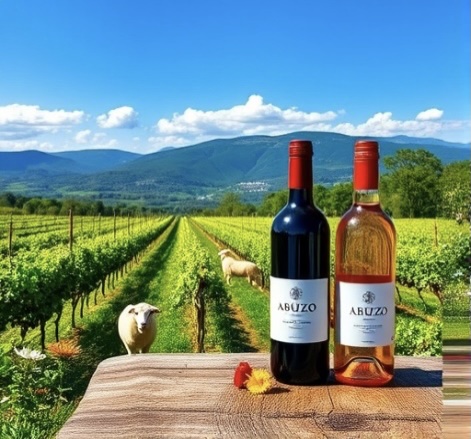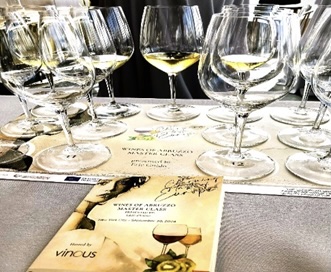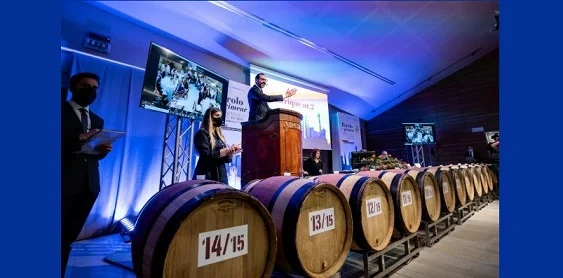Abruzzo’s wines embody a unique blend of tradition, indigenous grape varieties, and expressive terroir. Located in central Italy, Abruzzo is bordered by the Apennine Mountains to the west and the Adriatic Sea to the east, creating ideal microclimates that enrich its vineyards. The region’s high-altitude slopes and coastal plains generate diverse microclimates, producing a wide range of wines. While cooler, mountain-influenced vineyards yield wines with bright acidity, coastal vineyards create wines with greater warmth and richness.
Attributes of Abruzzo Wines
Abruzzo stands out for its dedication to sustainable viticulture. The region is a leader in organic practices, with about 32% of its vineyards certified organic. While certified biodynamic wineries make up a smaller proportion (fewer than 5%), many producers embrace biodynamic methods without formal certification. By prioritizing low-intervention techniques and native yeasts, winemakers allow the grapes’ natural flavors to shine, further strengthening the connection between the wine and its land.
Healthy, Signature Grapes
The Pergola Abruzzese, a traditional vine-training system, is widely used to control sunlight exposure and ventilation. This method, ideal for Abruzzo’s hot summers, minimizes disease and helps preserve grape quality.
Trebbiano d’Abruzzo is the main white variety in the region, producing fresh, mineral-driven wines with citrus and floral notes. Montepulciano d’Abruzzo is the flagship red grape of Abruzzo, yielding deeply colored, robust wines with soft tannins and notes of black cherry and plum. Pecorino is an ancient white grape, recently revived, noted for its bright acidity and complex aromatics. Additionally, Abruzzo’s winemakers often favor traditional large oak casks over smaller barriques, further preserving the wines’ authentic character.
Terroir is Unique
The soils in Abruzzo are incredibly diverse, ranging from fertile clay and limestone to sandy and alluvial deposits. These various soil types contribute different elements to the final flavor profile of the wines. Clay and limestone soils, common in many of Abruzzo’s best-known wine-producing areas (such as the hills surrounding the town of Teramo), help retain moisture while allowing for good drainage. This encourages grapevines to develop deep root systems and produce complex, balanced wines. Sandy soils in coastal areas help regulate water retention, leading to drought-resistant vines and wines with more defined minerality.
Influence of the Adriatic Sea
The Adriatic coast plays a significant role in the region’s climate, ensuring that vineyards near the sea experience milder temperatures, especially during the summer. This moderating influence prevents the grapes from becoming too hot, allowing them to ripen slowly and maintain acidity. Additionally, sea breezes help reduce humidity, which can be a risk for fungal diseases, making Abruzzo an ideal place for organic and sustainable farming practices.
Historical Roots
Abruzzo’s winemaking legacy dates back to the 6th century BCE, when the Etruscans cultivated vines. Ancient Roman writers like Pliny the Elder praised Abruzzo’s wines, and the name Aprutium appears in Roman texts on the wine trade. During the Middle Ages, Benedictine and Cistercian monks cultivated vineyards and developed the pergola (tendone) system to protect grapes from humidity.
Until the 1960s, large landowners controlled production, which was primarily for local consumption. However, from the 1960s through the 1990s, Abruzzo saw a transformation toward higher-quality production, incorporating modern winemaking techniques, increased boutique wineries, and a stronger focus on sustainable practices, garnering international recognition.
Current Challenges
Abruzzo’s wine industry faces several challenges, including the need for sustainable water management solutions, the impact of climate change, rising production costs, and a shortage of younger generations willing to take over family vineyards. In addition, young entrants face high costs and need significant resources for equipment investments. Economic pressures, such as the rising costs of energy and materials, supply chain disruptions, and compliance with new EU environmental regulations add to the complexity of the industry.
Economic Impact and Global Presence
Abruzzo is a major player in Italy’s wine industry, producing approximately 3 million hectoliters annually and contributing 3-4% of Italy’s total wine output. The region’s wine sector supports a large workforce and creates substantial seasonal employment during the harvest. Additionally, Abruzzo’s wines are a valuable export, with Montepulciano d’Abruzzo leading in markets such as Germany, the United States, and the UK. In Asia, Japan is an established market, while China, South Korea, and Singapore show growing interest. The strongest growth potential lies in the Asian and Nordic markets, with increasing demand for premium and sustainable wines, especially Montepulciano d’Abruzzo and Trebbiano d’Abruzzo. Abruzzo wines, often more competitively priced than those from other Italian regions, help bolster Italy’s position as a global wine exporter.
Tourism and Regional Development
Wine tourism is a growing economic driver, with initiatives like the Strade del Vino (Wine Routes) attracting visitors and boosting the local hospitality sector. Abruzzo’s wine industry also contributes to rural development, supporting traditional farming communities and preserving the region’s agricultural landscape.

The Wines:
1. Francesco Cirelli 2021 Trebbiano d’Abruzzo Anfor.
production Method: Fermented and aged in terracotta amphora (anfora)
The Francesco Cirelli Winery in Abruzzo is known for its commitment to organic farming and natural winemaking. Established by Francesco Cirelli and located in the Teramo hills, the winery has garnered attention for its minimalist approach and dedication to expressing the purity of the land.
Francesco Cirelli, originally an economics student, made a career change driven by his passion for the land and a desire to produce authentic, natural wines. He established the winery in the early 2000s on a 22-hectare farm in the Colline Teramane DOCG area of Abruzzo, a region ideal for Montepulciano and Trebbiano grapes. Cirelli is an innovator in Abruzzo, as his amphora-aged wines represent a fusion of ancient techniques with modern organic farming.
This wine is part of a broader movement to elevate Trebbiano d’Abruzzo’s reputation. Organic and biodynamic farming practices often involve fermenting wines with indigenous yeasts. These natural yeasts, present on the grape skins and in the vineyard environment, help create wines that authentically reflect the terroir of the region.
The wines are aged in amphora allowing natural micro-oxygenation without imparting flavors from oak or other materials. The result is a wine that is fresh, pure, and expressive of the fruit, land, soil health, and biodiversity. In addition to the vineyards, Cirelli’s farm includes olive groves, livestock, and vegetable gardens, reinforcing a sustainable, circular farming approach.
Cirelli’s philosophy and practices have influenced a new wave of winemakers in Abruzzo and beyond, particularly those focused on organic and natural winemaking. His wines have earned international recognition for their unique style and commitment to terroir-driven, natural expressions of Montepulciano, Trebbiano, and other varieties.
Wine Notes
The wine offers hues of bright straw yellow with golden hints. The aroma carries a complex mix of yellow apple, citrus blossom, herbs, and distinctive mineral notes. On the palate, the wine is medium-bodied with crisp acidity, complemented by a notable textural complexity due to amphora aging.
2.Illuminati Pieluni 2019 Colline Teramane Montepulciano d’Abruzzo Riserva
The Illuminati winery was established in 1890 by Nicola Illuminati in Controguerra, located in the Teramo province of Abruzzo. This family-owned estate has a long history of dedication to Montepulciano and Trebbiano grapes, expressing the unique terroir of the Colline Teramane, a subregion known for producing some of the finest Montepulciano wines. Over the generations, the Illuminati family has modernized their winemaking techniques while maintaining traditional methods, which has helped them gain recognition both in Italy and internationally.
In 2003, Colline Teramane earned DOCG status, solidifying its reputation as a premier area for Montepulciano d’Abruzzo wines. Illuminati’s Pieluni label represents the pinnacle of the estate’s Montepulciano production, capturing the power and elegance of this grape.
Wine Notes
The Pieluni 2019 is a striking expression of Montepulciano d’Abruzzo, showcasing both the intensity and elegance characteristic of the variety while reflecting the unique terroir of the Colline Teramane region. Aged for approximately two years in oak barrels and further refined in the bottle, this wine offers remarkable complexity, structure, and significant aging potential.
Visually, the wine captivates with its deep, dark ruby-red color, accented by vibrant purple highlights. The nose is rich and enticing, with layers of black cherries, dark plums, and blackberry jam, complemented by the complex nuances of chocolate, tobacco, and vanilla from the oak aging, along with a delicate touch of spice.
On the palate, the Pieluni 2019 is full-bodied and velvety, with a seamless integration of ripe dark fruit flavors like blackcurrant and cherry, supported by earthy undertones of leather and a subtle hint of licorice. The tannins are finely structured and well-integrated, providing balance while remaining smooth and approachable. The finish is long and persistent, leaving a lingering impression of dark fruit, cocoa, and spice.
This wine is a perfect match for rich, flavorful dishes. Pair it with hearty meats such as lamb or beef stew, or enjoy it alongside aged cheeses that highlight its bold structure.




